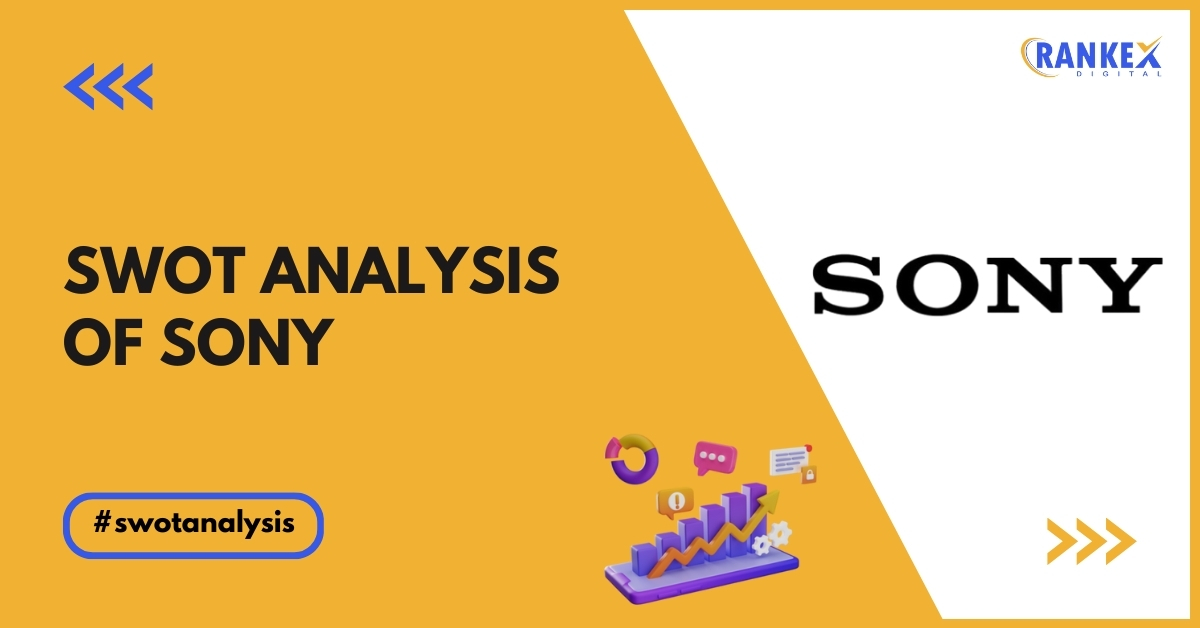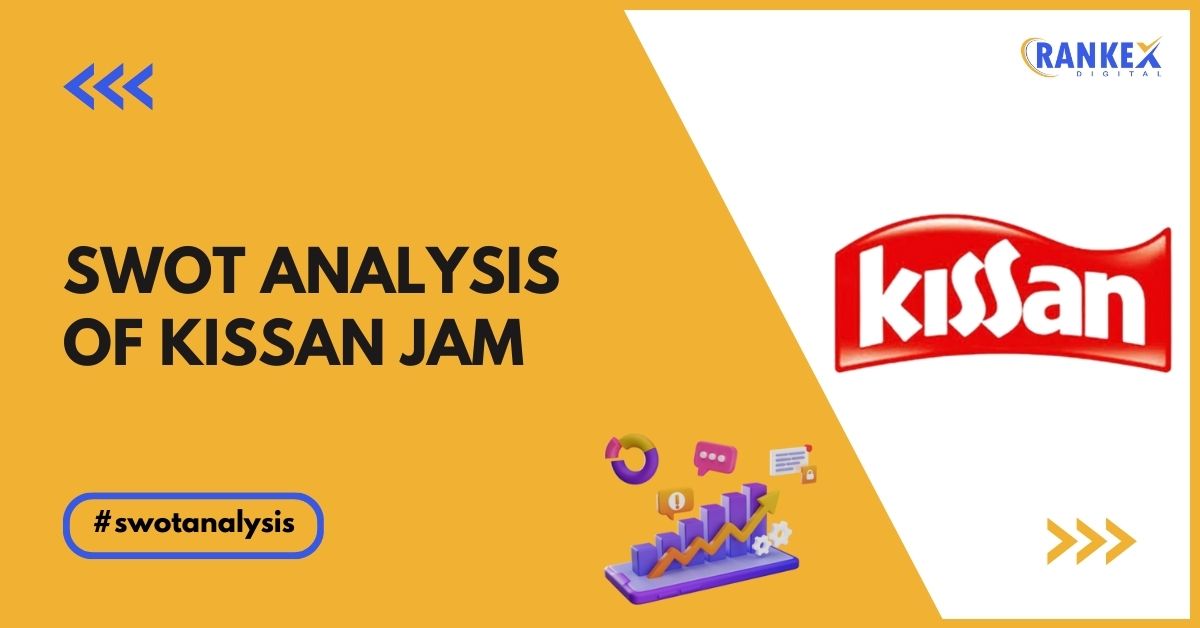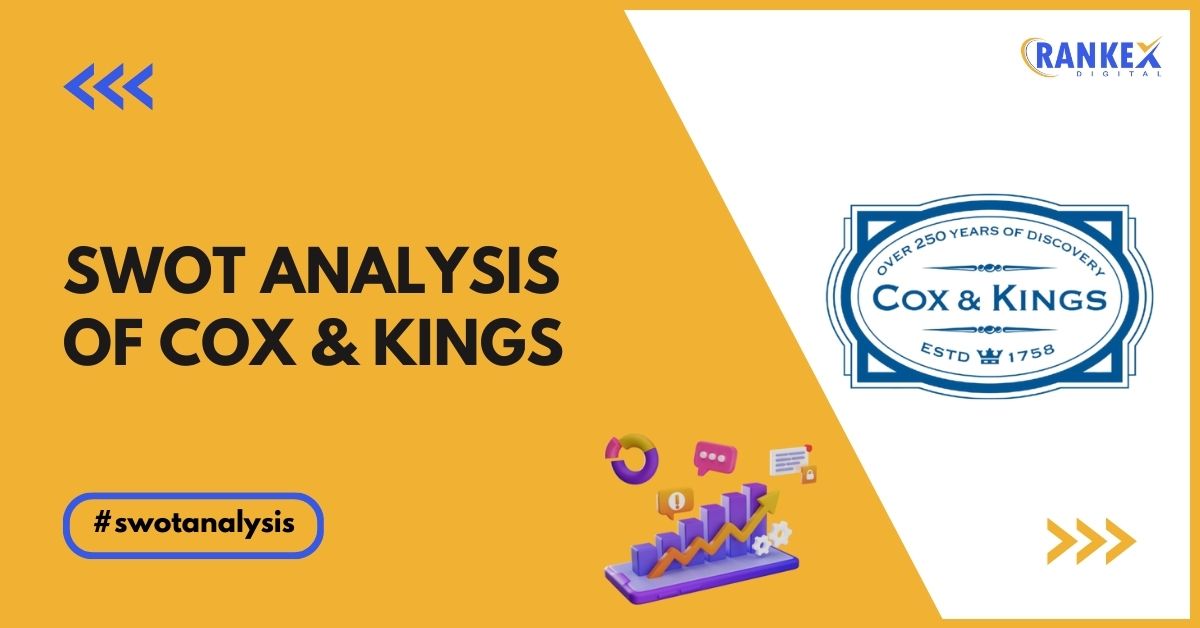Sony Corporation, a global leader in electronics, gaming, and entertainment, has significantly influenced various industries since its inception. Founded in 1946, Sony is renowned for its innovative products and captivating entertainment content, from groundbreaking gaming consoles to blockbuster films and music.
Understanding the strengths, weaknesses, opportunities, and threats (SWOT) of Sony is crucial for analyzing its current market position and future strategies. This article provides an in-depth SWOT analysis of Sony Company, exploring its key attributes and competitive landscape.
In this blog
Overview of Sony Corporation
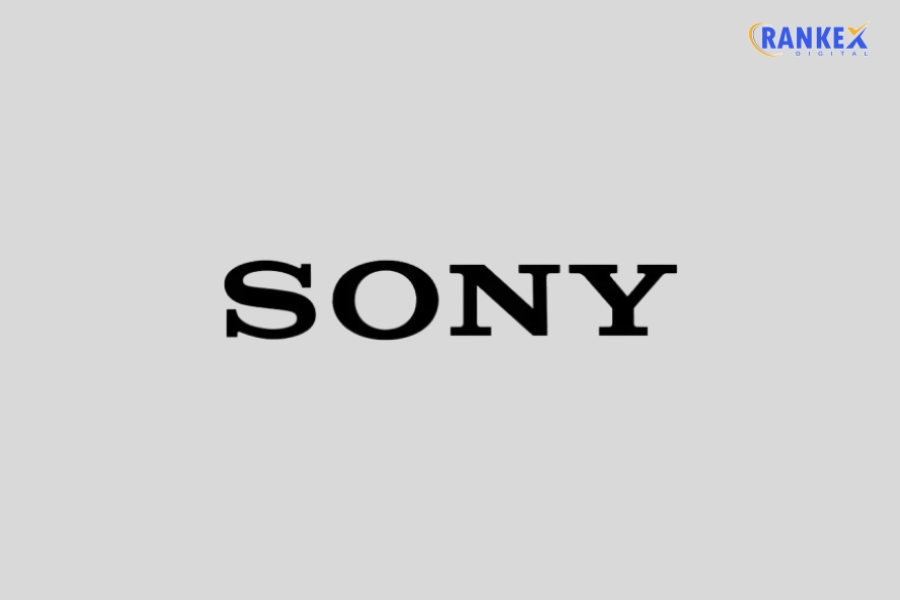
Sony Corporation is headquartered in Tokyo, Japan, and operates in multiple sectors, including consumer electronics, gaming, entertainment, and financial services. The company is best known for its PlayStation gaming consoles, Sony Pictures film studio, and Sony Music.
Sony has a diverse portfolio of products and services, including televisions, audio equipment, cameras, and smartphones, which are marketed under the Sony brand.
Quick Stats About Sony Corporation
| Attribute | Details |
|---|---|
| Founder | Masaru Ibuka and Akio Morita |
| Year Founded | 1946 |
| Origin | Tokyo, Japan |
| No. of Employees | 114,000+ |
| CEO | Kenichiro Yoshida |
| Company Type | Public |
| Market Cap | $118 Billion |
| Annual Revenue | $81 Billion |
| Net Profit | $10 Billion |
Current News of Sony Corporation
- Innovation in Gaming: Sony continues to invest heavily in its gaming division, with plans for new titles and enhanced features for its PlayStation platform.
- Expansion in Content Creation: The company is actively acquiring studios and talent to bolster its film and music divisions.
- Sustainability Initiatives: Sony is focusing on reducing its carbon footprint and developing eco-friendly products.
- Collaboration with Tech Firms: Sony has formed partnerships with various technology companies to enhance its product offerings, particularly in AI and cloud computing.
SWOT Analysis of Sony Company
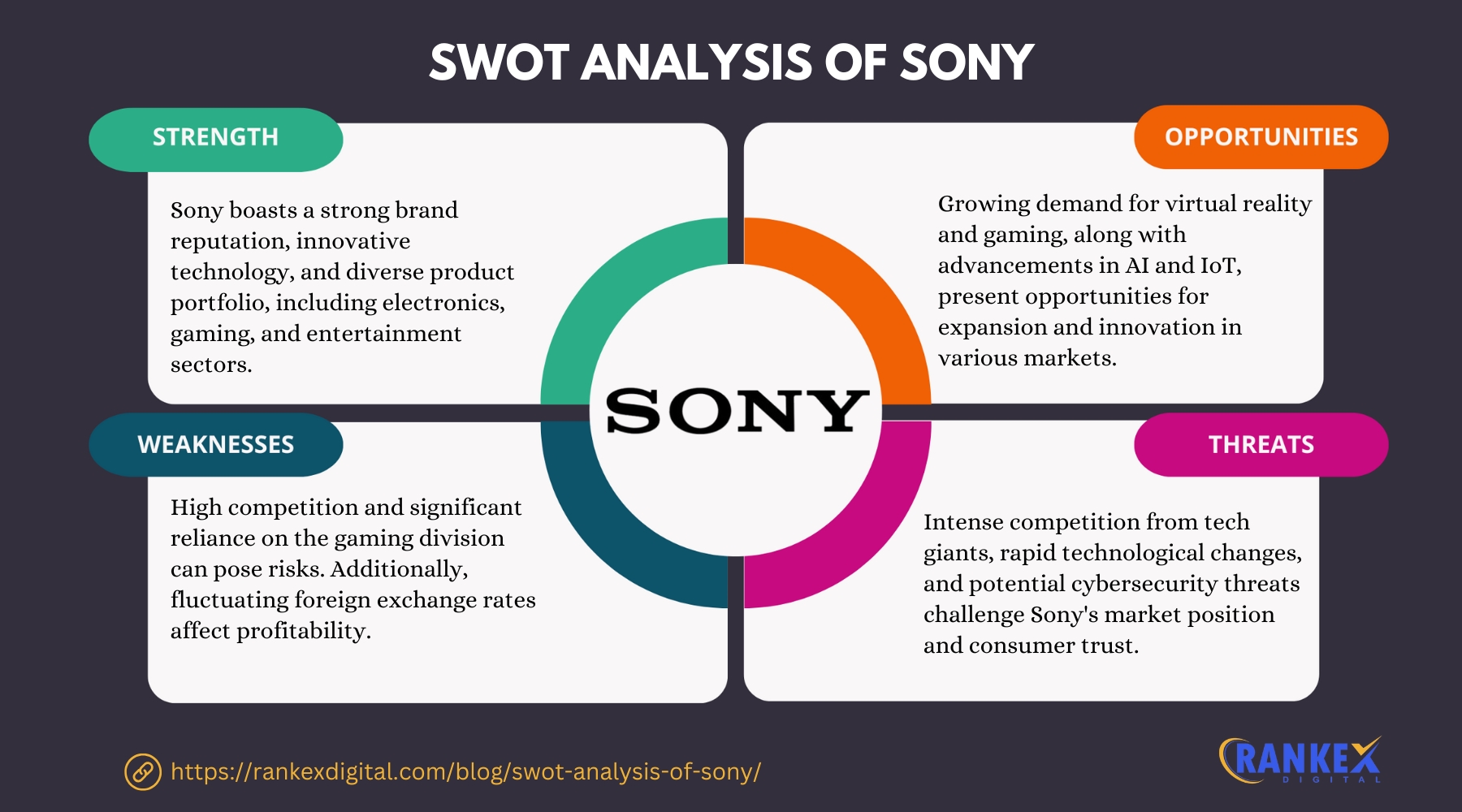
Strengths of Sony Corporation
- Strong Brand Recognition:
- Global Presence: Sony is a household name around the world, associated with high-quality products and innovation. This strong brand equity translates to customer loyalty, repeat purchases, and a competitive edge in the market.
- Trust and Reliability: The brand’s reputation for producing reliable and innovative products, such as the PlayStation and Bravia televisions, fosters consumer trust.
- Diverse Product Range:
- Variety of Offerings: Sony’s product portfolio includes electronics (televisions, audio equipment), gaming consoles (PlayStation), music (Sony Music), and movies (Sony Pictures). This diversification helps mitigate risks associated with reliance on a single market or product category.
- Market Segmentation: By catering to various consumer needs and preferences, Sony can target different demographic groups effectively.
- Innovative Technology:
- Pioneering Products: Sony has a long history of leading technological advancements, particularly in gaming and imaging. For example, the PlayStation series has revolutionized the gaming industry, while Alpha cameras are known for their quality and performance.
- Investment in R&D: Continuous investment in research and development allows Sony to stay ahead of competitors and push the boundaries of technology.
- Robust Financial Performance:
- Strong Revenue Streams: Sony has a diversified income portfolio, which includes hardware sales, software sales, and services. This helps maintain a stable financial position.
- Ability to Invest: Healthy profit margins provide the company with the financial resources to invest in new technologies, acquisitions, and market expansion.
- Established Entertainment Division:
- Synergies Across Divisions: With its presence in music and film, Sony can create synergistic opportunities, such as using popular music in film soundtracks or cross-promoting its gaming content with film releases.
- Content Creation: Ownership of Sony Pictures and Sony Music enables the company to create and distribute original content, further solidifying its position in the entertainment industry.
Weaknesses of Sony Corporation
- High Competition:
- Market Saturation: The electronics and entertainment markets are dominated by strong competitors like Apple, Samsung, and Microsoft, which pressure Sony to continuously innovate and differentiate its offerings.
- Price Wars: Competition often leads to aggressive pricing strategies, which can erode profit margins.
- Dependence on Key Products:
- Revenue Concentration: A significant portion of Sony’s revenue is generated from its gaming division (PlayStation) and entertainment sectors, making it susceptible to changes in consumer preferences and market conditions.
- Vulnerability to Market Trends: Any decline in these segments could have a substantial impact on the overall financial health of the company.
- Challenges in Supply Chain:
- Semiconductor Shortages: Global supply chain disruptions, particularly in semiconductor production, have affected Sony’s ability to manufacture products, leading to delays and potential loss of sales.
- Dependence on Third-Party Suppliers: Relying on external suppliers for critical components can create vulnerabilities, especially in times of crisis.
- Limited Market Share in Some Areas:
- Struggles in Smartphones: Despite efforts in the mobile sector, Sony has not been able to gain significant market share in smartphones, facing stiff competition from more established players.
- Personal Computers: Similarly, Sony has struggled to maintain a strong presence in the personal computer market, limiting its growth potential in this segment.
Opportunities for Sony Corporation
- Growth in the Gaming Industry:
- E-sports and Streaming: The rise of e-sports and gaming content consumption creates opportunities for Sony to expand its offerings, including new gaming titles and subscription services.
- PlayStation Network: Enhancing the online gaming experience and integrating services like PlayStation Plus can drive revenue growth.
- Expansion of Streaming Services:
- Content Distribution: With increasing demand for streaming content, Sony can leverage its entertainment division to expand its presence in the streaming market through partnerships or its platforms.
- Integration of Services: By integrating gaming and entertainment services, Sony can create a more holistic user experience.
- Technological Advancements:
- AI, VR, and AR: Innovations in artificial intelligence, virtual reality, and augmented reality present opportunities for Sony to develop new products and enhance existing ones, particularly in gaming and imaging.
- Smart Home Technology: Expanding into smart home products could tap into a growing market segment and create new revenue streams.
- Sustainability Focus:
- Eco-friendly Products: The trend towards sustainability presents an opportunity for Sony to lead in developing eco-friendly products and practices, enhancing its brand image and appeal to environmentally conscious consumers.
- Corporate Responsibility: Emphasizing sustainability in corporate strategies can enhance reputation and customer loyalty.
Threats to Sony Corporation
- Rapid Technological Changes:
- Need for Continuous Innovation: The fast-paced nature of technology means that Sony must consistently innovate to keep up with competitors and meet changing consumer expectations.
- Risk of Obsolescence: Failure to adapt to new technologies can lead to product obsolescence and loss of market share.
- Economic Uncertainty:
- Consumer Spending Impact: Economic downturns can lead to decreased consumer spending on electronics and entertainment, affecting sales and profitability.
- Currency Fluctuations: Being a global company, fluctuations in currency exchange rates can impact profitability, especially in international markets.
- Cybersecurity Risks:
- Digital Threats: As a technology-driven company, Sony is vulnerable to cyberattacks, which could compromise customer data and damage its reputation.
- Impact on Operations: Cybersecurity incidents can disrupt business operations and lead to significant financial losses.
- Regulatory Challenges:
- Changing Regulations: As technology and media industries face increasing scrutiny, changes in regulations can impact Sony’s business operations and compliance costs.
- Global Trade Policies: Tariffs and trade policies can affect supply chains and pricing strategies, influencing overall profitability.
Top Competitors of Sony Corporation
Conclusion
The SWOT analysis of Sony Corporation reveals its strong brand recognition, diverse product range, innovative technology, and robust financial performance as key strengths. However, the company faces challenges such as high competition, dependence on key products, and supply chain issues.
Opportunities for Sony lie in the growth of the gaming industry, expansion of streaming services, technological advancements, and sustainability focus. On the other hand, threats include rapid technological changes, economic uncertainty, cybersecurity risks, and regulatory challenges.
By leveraging its strengths and opportunities while addressing its weaknesses and threats, Sony Corporation can continue to innovate and maintain its leadership position across its various business sectors.
Frequently Asked Questions
What is Sony’s core business focus?
Sony primarily focuses on consumer electronics, gaming, entertainment, and financial services.
How has Sony performed in the gaming industry?
Sony has a strong presence in the gaming industry with its PlayStation consoles, consistently leading in sales and user engagement.
What are the recent innovations introduced by Sony?
Recent innovations include advancements in gaming technology, high-resolution cameras, and eco-friendly product initiatives.
How does Sony address cybersecurity threats?
Sony invests in robust cybersecurity measures, including encryption, regular security audits, and employee training to mitigate risks.
What is Sony’s approach to sustainability?
Sony is committed to reducing its carbon footprint and developing sustainable products, aligning with global environmental goals.

